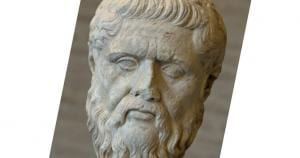What is going on?
 If we wish to follow the Logos where He leads, we need to listen to critics, especially those with interesting things to say. Jeff Williams is a critic of metaphysics. A University of Chicago grad, he agreed to present his argument and I have posted it here unedited (except for some formatting and the title). As result of his rejection of metaphysics, he rejects objective moral law as an illusion.
If we wish to follow the Logos where He leads, we need to listen to critics, especially those with interesting things to say. Jeff Williams is a critic of metaphysics. A University of Chicago grad, he agreed to present his argument and I have posted it here unedited (except for some formatting and the title). As result of his rejection of metaphysics, he rejects objective moral law as an illusion.
Mr. Williams previously argued that Athens has no need of Jerusalem, which contributes nothing good to Western civilization. I responded and enjoyed the interaction immensely. Mr. Williams has taken the time to discuss Martin Heidegger, a philosopher not much in favor when I was in graduate school. I have enjoyed reading more Heidegger (alas in translation). As usual, I allowed his post to stand without comment for a time and now here is a response. Mr. Williams suggested to me that I had not gotten him right, so it seemed decent and in order to let him respond. I suggested that Mr. Williams has ended up looking for a pony, because he has found a pile of LEGO blocks shaped like a pony.
Mr. Williams finds my response lacking, so I joyfully invite you to follow the argument where it leads!
Mr. Williams Against Objective Morality
Perhaps we two are destined to eternally consider each other to be in error, which is in no way a bad thing. I shudder in horror at the thought of everyone agreeing with me – a fate no better than solipsistic imprisonment. But as you believed my last response to contain error, so I find with yours.
Your response rests on the assertion that we cannot escape the metaphysical because our very own consciousness, by which we exist as thinking beings, is itself noumenal and beyond physical explanation:
“We all, in fact, begin with a non-physical experience; our consciousness.”
This is a move to establish the metaphysical as real in order to reason from that premise that morality, as an ought rather than the is of the physical, is necessarily derived from the metaphysical. But this argument fails from the defect of the unwarranted premise. Although it was commonly believed among metaphysicians since at least Descartes that mind was proven to be non-physical, that now is not so obviously the case.
In my last response, I traced the continuous appropriation of formerly metaphysical subjects by inquiry into the physical manifestations since the time of Bacon. The word “ontology” had been coined at that time to accommodate the migration ofthe question of being increasingly into this realm of the physical. Consciousness is but the most recent emigrant from the land of metaphysics to that of neuroscience, theoretical physics, and non-metaphysical philosophy. I believe that denying the ability to explain consciousness solely through physical terms will someday look as naïve as those who thought gravity could never be explained. Some physicists are looking into evidence of a sort of panpsychist universe with levels of consciousness varying with levels of complexity, which could ultimately explain entanglement. This is an important premise, for example, in Sean Carroll’s Many Worlds Theory. The philosopher Thomas Nagel has also done important work in this area. Other physicists and neuroscientists study the similarities between quantum indeterminacy and action of wave functions to the function of the brain and how mind could emerge purely from physical waves, which are the basis of all reality. Michio Kaku, among others, is a proponent of this direction of study which could also explain the reality of free will. It’s interesting to note that the two instances of being that seem to not be under deterministic causality are quantum events and the mind.
If the mind proves to be a physical manifestation, the last gasp of metaphysics will expire along with any concept of god. Your claim to experience god could be no more than a metaphysical interpretation of what is properly the mystery of physical Being.
You then claimed:
“They cannot account for the existence of numbers or ideas, even though both numbers and ideas seem to exist to exist to the experts that study such concepts.”
Not only can we, but I did. Much depends on what you mean by existence, but it has been shown that numbers and ideas exist solely in the human subjective mind. Your claim that the experts believe otherwise is somewhat akin to the fallacy of argumentum verecundiam. Kant clearly showed the subjective ground of ideas and number, which is analytically derived in imagination from reason through the subjective senses of space and time. Since then, evolutionary biologists have shown how reason came to evolve in homo sapiens, around when that happened, and the changes in the brain that enabled it. Contemporary neuroscientists such as Donald Hoffman and Anil Seth demonstrate how this happens in the brain. I would clearly count Kant, evolutionary biologists, and contemporary neurologists among the experts.
Moving on to the grounding of morality, you show you probably didn’t understand my argument when you wrote:
“And surely nothing has gone wrong with looking at blood and genes in human history without a ‘love your neighbor’, and ‘love your enemies’ checking our…our interpretation of what is.”
But that was, of course, my point. We are made of complex drives, otherwise we would not need moral sensibilities. These moral sensibilities are a very late evolutionary development which enable our consciousness to reach a higher plain and are all we need to determine the ought from the is through our evolved conscience which is derived from these sensibilities and refined over time. The only question is the grounds for these sensibilities.
I do take offense at the last sentence of the point above:
“No follower of Heidegger should take[sic] about ‘blood’ without caution.”
First, I am not a follower of Heidegger or anybody else. I do take Heidegger’s seminal thoughts on language, poetry and Being as a starting point, but for decades have forged my own path. Second, that particular argument does not derive directly from Heidegger. Third, you will never encounter anyone more opposed to Blut und Boden nationalism than I and, in that regard, I do not repeat Heidegger’s mistake. It sure be clear that I do not mean blood, genes and earth as ethnic and territorial terms, but rather the mysterious ground of human existence overall.
You further that misunderstanding here:
“Mr. Williams should explain how, exactly, logical truth or mathematical truth evolves.”
Well, I should if I ever claimed that, but I never did. The innate ability to think with according to reason, and mathematically which is derivative of reason thought in space and time, evolved with our frontal cortex, but the “truths” of them are static. It is our interpretation of innate sensibilities (as opposed to a prioricategories of understanding) such as morality, taste, beauty, etc. that evolve over time. You coupled to your repeated claim for metaphysical objectification of the world and suggested I answer this:
“…if Mr. Williams has a way of explaining reality without A=Abeing true, then he should tell us what that way is.”
A more careful reading of my last response would reveal that I did explain it as the difference between metaphysicalobjectification and ontological thought. Perhaps an example would help? You know your wife in a deeper sense than objectification and would surely say that your wife is your wife, with “is” being more than just a copula, but would you say she is equal and additive to or replaceable by any other wife? When you reduce to a concept you eliminate the physical essencewhich in this case inheres in the physical being of your wife.
Next, we move on to the topic of our discussion: objective morality. Ironically, you also portray this objective law as altering over time. I had noted that if the morality of the Bible were objective it would also be immutable, yet very few of us would want to return to the laws of Leviticus and Deuteronomy. Our refined moral sense finds much of it barbaric and offensiveto our moral taste. You try to explain this away thus:
“…a good God must educate broken people over time…”
There is an undeniable contradiction here: the Bible cannot be a source of objective morality and change over time. Morality is either objective and immutable or it is alterable over time. Itcannot be both. Even more, a “good God” would not countenance slavery, genocide or stoning of people with different beliefs even in the primitive Bronze Age. I would have expected him to set a better standard rather than one that is now too egregious to accept. It is infinitely more likely that man, on his own, improved his moral senses instead as he distanced himself from Biblical morality. It is undeniable that the Bible provides no acceptable immutable objective law.
Next you construct a strawman in order to more easily confront an argument I made:
“When one says ‘morality is an innate sensibility’ then one has run into explanation by semantics: like the use of instinct to describe why a being acts as he does.”
Even if I had said something like that, instinct would be a better explanation than an imaginary metaphysical construction, but you conflate sensibility with instinct. Instinct is a wired and usually involuntary reaction to specific stimuli. Sensibility is very different in that it is a general emotional attitude toward something that we are able to direct through reason or contemplation. You attempt here to both misstate evolution as araw-toothed drive that always seeks its own individual need over all others and to reduce our mental abilities to mindless instinct. Both are false. As I noted last time, and you still ignore, evolution seeks best fit for adaptation, and many times that involves cooperation among individual instead of competition. The animal world is rife with such examples, and our innate sensibilities for empathy, fairness and love contribute to that enabling cooperation – an adaptation that has allowed us tosurvive beyond any other species.
Ignoring the real argument I made, you then project your own confusion onto me:
“This direction from nature is not sanctified so should I do as nature suggests? Why? This is not a ground for morality but an explanation for why we might choose particular moral positions. Williams is confused.”
We get our nature from Nature (Being), and if you wish to do otherwise, you only de-nature man. It is a ground because we can actually know it physically, understand our place in it, andfind our own nature revealed in it. What you suggest instead is to imagine a realm that we cannot experience and have no reason to believe exists. That is not a ground for morality or anything else. From our nature we understand empathy, fairness and love to be the ground of the good. Because we are such beings, it is in our nature to do so. As I said, we can do no other. Despite your simple denial to the contrary, Being as essence in this physical world is the only possible source of sanctification, and we can only derive the good from this nature. You also ignore the much larger question of the possibility of intention in Being itself, which seems to reveal itself over time; in this case in the arc of morality from Bronze Age barbarism toward the yet distant goal of empathetic cooperation and man’s purpose as the conscious experience of the universe for Being.
I would go further and claim that your own Biblical understanding of morality is itself a projection onto an unreal and imaginary realm of the fears and hopes of man trying to work out his nature. Yours is in fact just another interpretation from our physical nature and the surrounding world, but one from a prior and very primitive stage of development of our consciousness. We have progressed at the same rate as ourthinking moved from metaphysics into ontology rightly thought as physical Being. With consciousness itself having emigrated to physical ontology, the gods are truly dead, and we can begin anew with a better understanding of who we are, and where we go.













